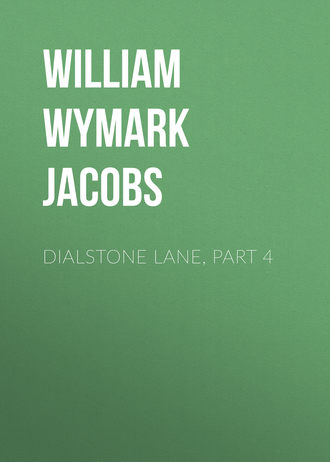 полная версия
полная версияDialstone Lane, Part 4

W. W. Jacobs
Dialstone Lane, Part 4
CHAPTER XIV
Mrs. Chalk watched the schooner until it was a mere white speck on the horizon, a faint idea that it might yet see the error of its ways and return for her chaining her to the spot. Compelled at last to recognise the inevitable, she rose from the turf on which she had been sitting and, her face crimson with wrath, denounced husbands in general and her own in particular.
"It's my husband's doing, I'm sure," said Mrs. Stobell, with a side glance at her friend's attire, not entirely devoid of self- congratulation. "That's why he wouldn't let me have a yachting costume. I can see it now."
Mrs. Chalk turned and eyed her with angry disdain.
"And that's why he wouldn't let me bring more than one box," continued Mrs. Stobell, with the air of one to whom all things had been suddenly revealed; "and why he wouldn't shut the house up. Oh, just fancy what a pickle I should have been in if I had! I must say it was thoughtful of him."
"Thoughtful!" exclaimed Mrs. Chalk, in a choking voice.
"And I ought to have suspected something," continued Mrs. Stobell, "because he kissed me this morning. I can see now that he meant it for goodbye! Well, I can't say I'm surprised. Robert always does get his own way."
"If you hadn't persuaded me to come ashore for that wretched luncheon," said Mrs. Chalk, in a deep voice, "we should have been all right."
"I'm sure I wasn't to know," said her friend, "although I certainly thought it odd when Robert said that he had got it principally for you. I could see you were a little bit flattered."
Mrs. Chalk, trembling with anger, sought in vain for a retort.
"Well, it's no good staying here," said Mrs. Stobell, philosophically. "We had better get home."
"Home!" cried Mrs. Chalk, as a vision of her bare floors and dismantled walls rose before her. "When I think of the deceitfulness of those men, giving us champagne and talking about the long evenings on board, I don't know what to do with myself. And your father was one of them," she added, turning suddenly upon Edward.
Mr. Tredgold disowned his erring parent with some haste, and, being by this time rather tired of the proceedings, suggested that they should return to the inn and look up trains—a proposal to which Mrs. Chalk, after a final glance seawards, silently assented. With head erect she led the way down to the town again, her bearing being so impressive that George the waiter, who had been watching for them, after handing her a letter which had been entrusted to him, beat a precipitate retreat.
The letter, which was from Mr. Stobell, was short and to the point. It narrated the artifice by which Mr. Chalk had been lured away, and concluded with a general statement that women were out of place on shipboard. This, Mrs. Stobell declared, after perusing the letter, was intended for an apology.
Mrs. Chalk received the information in stony silence, and, declining tea, made her way to the station and mounted guard over her boxes until the train was due. With the exception of saying "Indeed!" on three or four occasions she kept silent all the way to Binchester, and, arrived there, departed for home in a cab, in spite of a most pressing invitation from Mrs. Stobell to stay with her until her own house was habitable.
Mr. Tredgold parted from them both with relief. The voyage had been a source of wonder to him from its first inception, and the day's proceedings had only served to increase the mystery. He made a light supper and, the house being too quiet for his taste, went for a meditative stroll. The shops were closed and the small thoroughfares almost deserted. He wondered whether it was too late to call and talk over the affair with Captain Bowers, and, still wondering, found himself in Dialstone Lane.
Two or three of the houses were in darkness, but there was a cheerful light behind the drawn blind of the captain's sitting-room. He hesitated a moment and then rapped lightly on the door, and no answer being forthcoming rapped again. The door opened and revealed the amiable features of Mr. Tasker.
"Captain Bowers has gone to London, sir," he said.
Mr. Tredgold drew his right foot back three inches, and at the same time tried to peer into the room.
"We're expecting him back every moment," said Mr. Tasker, encouragingly.
Mr. Tredgold moved his foot forward again and pondered. "It's very late, but I wanted to see him rather particularly," he murmured, as he stepped into the room.
"Miss Drewitt's in the garden," said Joseph.
Mr. Tredgold started and eyed him suspiciously. Mr. Tasker's face, however, preserving its usual appearance of stolid simplicity, his features relaxed and he became thoughtful again.
"Perhaps I might go into the garden," he suggested.
"I should if I was you, sir," said Joseph, preceding him and throwing open the back door. "It's fresher out there."
Mr. Tredgold stepped into the garden and stood blinking in the sudden darkness. There was no moon and the night was cloudy, a fact which accounted for his unusual politeness towards a cypress of somewhat stately bearing which stood at one corner of the small lawn. He replaced his hat hastily, and an apologetic remark concerning the lateness of his visit was never finished. A trifle confused, he walked down the garden, peering right and left as he went, but without finding the object of his search. Twice he paced the garden from end to end, and he had just arrived at the conclusion that Mr. Tasker had made a mistake when a faint sound high above his head apprised him of the true state of affairs.
He stood listening in amazement, but the sound was not repeated. Ordinary prudence and a sense of the fitness of things suggested that he should go home; inclination suggested that he should seat himself in the deck-chair at the foot of the crow's-nest and await events. He sat down to consider the matter.
Sprawling comfortably in the chair he lit his pipe, his ear on the alert to catch the slightest sound of the captive in the cask above. The warm air was laden with the scent of flowers, and nothing stirred with the exception of Mr. Tasker's shadow on the blind of the kitchen window. The clock in the neighbouring church chimed the three-quarters, and in due time boomed out the hour of ten. Mr. Tredgold knocked the ashes from his pipe and began seriously to consider his position. Lights went out in the next house. Huge shadows appeared on the kitchen blind and the light gradually faded, to reappear triumphantly in the room above. Anon the shadow of Mr. Tasker's head was seen wrestling fiercely with its back collar-stud.
"Mr. Tredgold!" said a sharp voice from above.
Mr. Tredgold sprang to his feet, overturning the chair in his haste, and gazed aloft.
"Miss Drewitt!" he cried, in accents of intense surprise.
"I am coming down," said the voice.
"Pray be careful," said Mr. Tredgold, anxiously; "it is very dark. Can I help you?"
"Yes—you can go indoors," said Miss Drewitt.
Her tone was so decided and so bitter that Mr. Tredgold, merely staying long enough to urge extreme carefulness in the descent, did as he was desired. He went into the sitting-room and, standing uneasily by the fireplace, tried to think out his line of action. He was still floundering when he heard swift footsteps coming up the garden, and Miss Drewitt, very upright and somewhat flushed of face, confronted him.
"I—I called to see the captain," he said, hastily, "and Joseph told me you were in the garden. I couldn't see you anywhere, so I took the liberty of sitting out there to wait for the captain's return."
Miss Drewitt listened impatiently. "Did you know that I was up in the crow's-nest?" she demanded.
"Joseph never said a word about it," said Mr. Tredgold, with an air of great frankness. "He merely said that you were in the garden, and, not being able to find you, I thought that he was mistaken."
"Did you know that I was up in the crow's-nest?" repeated Miss Drewitt, with ominous persistency.
"A—a sort of idea that you might be there did occur to me after a time," admitted the other.
"Did you know that I was there?"
Mr. Tredgold gazed at her in feeble indignation, but the uselessness of denial made truth easier. "Yes," he said, slowly.
"Thank you," said the girl, scornfully. "You thought that I shouldn't like to be caught up there, and that it would be an amusing and gentlemanly thing to do to keep me a prisoner. I quite understand. My estimate of you has turned out to be correct."
"It was quite an accident," urged Mr. Tredgold, humbly. "I've had a very worrying day seeing them off at Biddlecombe, and when I heard you up in the nest I succumbed to sudden temptation. If I had stopped to think—if I had had the faintest idea that you would catechise me in the way you have done—I shouldn't have dreamt of doing such a thing."
Miss Drewitt, who was standing with her hand on the latch of the door leading upstairs, as a hint that the interview was at an end, could not restrain her indignation.
"Your father and his friends have gone off to secure my uncle's treasure, and you come straight on here," she cried, hotly. "Do you think that there is no end to his good-nature?"
"Treasure?" said the other, with a laugh. "Why, that idea was knocked on the head when the map was burnt. Even Chalk wouldn't go on a roving commission to dig over all the islands in the South Pacific."
"I don't see anything to laugh at," said the girl; "my uncle fully intended to burn it. He was terribly upset when he found that it had disappeared."
"Disappeared?" cried Mr. Tredgold, in accents of unmistakable amazement. "Why, wasn't it burnt after all? The captain said it was."
"He was going to burn it," repeated the girl, watching him; "but somebody took it from the bureau."
"Took it? When?" inquired the other, as the business of the yachting cruise began to appear before him in its true colours.
"The afternoon you were here waiting for him," said Miss Drewitt.
"Afternoon?" repeated Mr. Tredgold, blankly. "The afternoon I was–" He drew himself up and eyed her angrily. "Do you mean to say that you think I took the thing?"
"It doesn't matter what I think," said the girl. "I suppose you won't deny that your friends have got it?"
"Yes; but you said that it was the afternoon I was here," persisted the other.
Miss Drewitt eyed him indignantly. The conscience-stricken culprit of a few minutes before had disappeared, leaving in his stead an arrogant young man, demanding explanations in a voice of almost unbecoming loudness.
"You are shouting at me," she said, stiffly.
Mr. Tredgold apologised, but returned to the charge. "I answered your question a little while ago," he said, in more moderate tones; "now, please, answer mine. Do you think that I took the map?"
"I am not to be commanded to speak by you," said Miss Drewitt, standing very erect.
"Fair-play is a jewel," said the other. "Question for question. Do you?"
Miss Drewitt looked at him and hesitated. "No," she said, at last, with obvious reluctance.
Mr. Tredgold's countenance cleared and his eyes softened.
"I suppose you admit that your father has got it?" said the girl, noting these signs with some disapproval. "How did he get it?"
Mr. Tredgold shook his head. "If those three overgrown babes find that treasure," he said, impressively, "I'll doom myself to perpetual bachelorhood."
"I answered your question just now," said the girl, very quietly, "because I wanted to ask you one. Do you believe my uncle's story about the buried treasure?"
Mr. Tredgold eyed her uneasily. "I never attached much importance to it," he replied. "It seemed rather romantic."
"Do you believe it?"
"No," said the other, doggedly.
The girl drew a long breath and favoured him with a look in which triumph and anger were strangely mingled.
"I wonder you can visit him after thinking him capable of such a falsehood," she said, at last. "You certainly won't be able to after I have told him."
"I told you in confidence," was the reply. "I have regarded it all along as a story told to amuse Chalk; that is all. I shall be very sorry if you say anything that might cause unpleasantness between myself and Captain Bowers."
"I shall tell him as soon as he comes in," said Miss Drewitt. "It is only right that he should know your opinion of him. Good-night."
Mr. Tredgold said "good-night," and, walking to the door, stood for a moment regarding her thoughtfully. It was quite clear that in her present state of mind any appeal to her better nature would be worse than useless. He resolved to try the effect of a little humility.
"I am very sorry for my behaviour in the garden," he said, sorrowfully.
"It doesn't matter," said the girl; "I wasn't at all surprised."
Mr. Tredgold recognised the failure of the new treatment at once. "Of course, when I went into the garden I hadn't any idea that you would be in such an unlikely place," he said, with a kindly smile. "Let us hope that you won't go there again."
Miss Drewitt, hardly able to believe her ears, let him go without a word, and in a dazed fashion stood at the door and watched him up the lane. When the captain came in a little later she was sitting in a stiff and uncomfortable attitude by the window, still thinking.
He was so tired after a long day in town that the girl, at considerable personal inconvenience, allowed him to finish his supper before recounting the manifold misdeeds of Mr. Tredgold. She waited until he had pushed his chair back and lit a pipe, and then without any preface plunged into the subject with an enthusiasm which she endeavoured in vain to make contagious. The captain listened in silence and turned a somewhat worried face in her direction when she had finished.
"We can't all think alike," he said, feebly, as she waited with flushed cheeks and sparkling eyes for the verdict. "I told you he hadn't taken the map. As for those three idiots and their harebrained voyage—"
"But Mr. Tredgold said that he didn't believe in the treasure," said the wrathful Prudence. "One thing is, he can never come here again; I think that I made him understand that. The idea of thinking that you could tell a falsehood!"
The captain bent down and, picking a used match from the hearthrug, threw it carefully under the grate. Miss Drewitt watched him expectantly.
"We mustn't quarrel with people's opinions," he said, at last. "It's a free country, and people can believe what they like. Look at Protestants and Catholics, for instance; their belief isn't the same, and yet I've known 'em to be staunch friends."
Miss Drewitt shook her head. "He can never come here again," she said, with great determination. "He has insulted you, and if you were not the best-natured man in the world you would be as angry about it as I am."
The captain smoked in silence.
"And his father and those other two men will come back with your treasure," continued Prudence, after waiting for some time for him to speak. "And, so far as I can see, you won't even be able to prosecute them for it."
"I sha'n't do anything," said Captain Bowers, impatiently, as he rose and knocked out his half-smoked pipe, "and I never want to hear another word about that treasure as long as I live. I'm tired of it. It has caused more mischief and unpleasantness than—than it is worth. They are welcome to it for me."
CHAPTER XV
Mr. Chalk's foot had scarcely touched the deck of the schooner when Mr. Tredgold seized him by the arm and, whispering indistinctly in his ear, hurried him below.
"Get your arms out of the cabin as quick as you can," he said, sharply. "Then follow me up on deck."
Mr. Chalk, trembling violently, tried to speak, but in vain. A horrid clanking noise sounded overhead, and with the desperation of terror he turned into the new cabin and, collecting his weapons, began with frantic haste to load them. Then he dropped his rifle and sprang forward with a loud cry as he heard the door close smartly and the key turn in the lock.
He stood gazing stupidly at the door and listening to the noise overhead. The clanking ceased, and was succeeded by a rush of heavy feet, above which he heard Captain Brisket shouting hoarsely. He threw a despairing glance around his prison, and then looked up at the skylight. It was not big enough to crawl through, but he saw that by standing on the table he could get his head out. No less clearly he saw how easy it would be for a mutineer to hit it.
Huddled up in a corner of the cabin he tried to think. Tredgold and Stobell were strangely silent, and even the voice of Brisket had ceased. The suspense became unbearable. Then suddenly a faint creaking and straining of timbers apprised him of the fact that the Fair Emily was under way.
He sprang to his feet and beat heavily upon the door, but it was of stout wood and opened inwards. Then a bright idea, the result of reading sensational fiction, occurred to him, and raising his rifle to his shoulder he aimed at the lock and pulled the trigger.
The noise of the explosion in the small cabin was deafening, but, loud as it was, it failed to drown a cry of alarm outside. The sound of heavy feet and of two or three bodies struggling for precedence up the companion-ladder followed, and Mr. Chalk, still holding his smoking rifle and regarding a splintered hole in the centre of the panel, wondered whether he had hit anybody. He slipped in a fresh cartridge and, becoming conscious of a partial darkening of the skylight, aimed hastily at a face which appeared there. The face, which bore a strong resemblance to that of Mr. Stobell, disappeared with great suddenness.
"He's gone clean off his head," said Captain Brisket, as Mr. Stobell staggered back.
"Mad as a March hare," said Mr. Tredgold, shivering; "it's a wonder he didn't have one of us just now. Call down to him that it's all right, Stobell."
"Call yourself," said that gentleman, shortly.
"Get a stick and raise the skylight," said Tredgold.
A loud report sounded from below. Mr. Chalk had fired a second and successful shot at the lock. "What's he doing?" inquired Stobell, blankly.
A sharp exclamation from Captain Brisket was the only reply, and he turned just as Mr. Chalk, with a rifle in one hand and a revolver in the other, appeared on deck. The captain's cry was echoed forward, and three of the crew dived with marvellous skill into the forecastle. The boy and two others dashed into the galley so hurriedly that the cook, who was peeping out, was borne backwards on to the stove and kept there, the things he said in the heat of the moment being attributed to excitement and attracting no attention. Tredgold, Brisket, and Stobell dodged behind the galley, and Mr. Chalk was left to gaze in open-mouthed wonder at the shrinking figure of Mr. Duckett at the wheel. They regarded each other in silence, until a stealthy step behind Mr. Chalk made him turn round smartly. Mr. Stobell, who was stealing up to secure him, dodged hastily behind the mainmast.
"Stobell!" cried Mr. Chalk, faintly.
"It's all right," said the other.
Mr. Chalk regarded his proceedings in amazement. "What are you hiding behind the mast for?" he inquired, stepping towards him.
Mr. Stobell made no reply, but with an agility hardly to be expected of one of his bulk dashed behind the galley again.
A sense of mystery and unreality stole over Mr. Chalk. He began to think that he must be dreaming. He turned and looked at Mr. Duckett, and Mr. Duckett, trying to smile at him, contorted his face so horribly that he shrank back appalled. He looked about him and saw that they were now in open water and drawing gradually away from the land. The stillness and mystery became unbearable, and with an air of resolution he cocked his rifle and proceeded with infinite caution to stalk the galley. As he weathered it, with his finger on the trigger, Stobell and the others stole round the other side and, making a mad break aft, stumbled down the companion-ladder and secured themselves below.
"Has everybody gone mad?" inquired Mr. Chalk, approaching the mate again.
"Everybody except you, sir," said Mr. Duckett, with great politeness.
Mr. Chalk looked forward again and nearly dropped his rifle as he saw three or four tousled heads protruding from the galley. Instinctively he took a step towards Mr. Duckett, and instinctively that much-enduring man threw up his hands and cried to him not to shoot. Mr. Chalk, pale of face and trembling of limb, strove to reassure him.
"But it's pointing towards me," said the mate, "and you've got your finger on the trigger."
Mr. Chalk apologized.
"What did Tredgold and Stobell run away for?" he demanded.
Mr. Duckett said that perhaps they were—like himself—nervous of firearms. He also, in reply to further questions, assured him that the mutiny was an affair of the past, and, gaining confidence, begged him to hold the wheel steady for a moment. Mr. Chalk, still clinging to his weapons, laid hold of it, and the mate, running to the companion, called to those below. Led by Mr. Stobell they came on deck.
"It's all over now," said Tredgold, soothingly.
"As peaceable as lambs," said Captain Brisket, taking a gentle hold of the rifle, while Stobell took the revolver.
Mr. Chalk smiled faintly, and then looked round in trepidation as the inmates of the galley drew near and scowled at him curiously.
"Get for'ard!" cried Brisket, turning on them sharply. "Keep your own end o' the ship. D'ye hear?"
The men shuffled off slowly, keeping a wary eye on Mr. Chalk as they went, the knowledge of the tempting mark offered by their backs to an eager sportsman being apparent to all.
"It's all over," said Brisket, taking the wheel from the mate and motioning to him to go away, "and after your determination, sir, there'll be no more of it, I'm sure."
"But what was it?" demanded Mr. Chalk. "Mutiny?"
"Not exactly what you could call mutiny," replied the captain, in a low voice. "A little mistake o' Duckett's. He's a nervous man, and perhaps he exaggerated a little. But don't allude to it again, for the sake of his feelings."
"But somebody locked me in the cabin," persisted Mr. Chalk, looking from one to the other.
Captain Brisket hesitated. "Did they?" he said, with a smile of perplexity. "Did they? I gave orders that that door was to be kept locked when there was nobody in there, and I expect the cook did it by mistake as he passed. It's been a chapter of accidents all through, but I must say, sir, that the determined way you came on deck was wonderful."
"Extraordinary!" murmured Mr. Tredgold.
"I didn't know him," attested Mr. Stobell, continuing to regard Mr. Chalk with much interest.
"I can't make head or tail of it," complained Mr. Chalk. "What about the ladies?"
Captain Brisket shook his head dismally and pointed ashore, and Mr. Chalk, following the direction of his finger, gazed spellbound at a figure which was signalling wildly from the highest point. Tredgold and Stobell, approaching the side, waved their handkerchiefs in response.
"We must go back for them," said Mr. Chalk, firmly.
"What! in this wind, sir?" inquired Brisket, with an indulgent laugh. "You're too much of a sailor to think that's possible, I'm sure; and it's going to last."
"We must put up with the disappointment and do without'em," said Stobell.
Mr. Chalk gazed helplessly ashore. "But we've got their luggage," he cried.
"Duckett sent it ashore," said Brisket. "Thinking that there was men's work ahead, and that the ladies might be in the way, he put it over the side and sent it back. And mind, believing what he did, I'm not saying he wasn't in the right."
Mr. Chalk again professed his inability to make head or tail of the proceedings. Ultimately—due time having been given for Captain Brisket's invention to get under way—he learned that a dyspeptic seaman, mistaking the mate's back for that of the cook, had first knocked his cap over his eyes and then pushed him over. "And that, of course," concluded the captain, "couldn't be allowed anyway, but, seeing that it was a mistake, we let the chap off."
"There's one thing about it," said Tredgold, as Chalk was about to speak; "it's shown us the stuff you're made of, Chalk."









